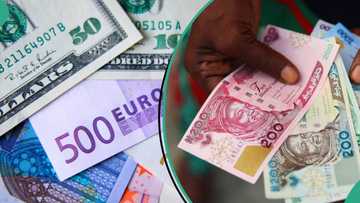Naira Plunges to Three-Month Low Amid High Reserves as Urge for Dollar Usage Increases
- On the black market, the naira fell to a three-month low of N1,530 per dollar on Monday as end consumers' demand for the currency grew
- This represents a 0.65 percent or N10 loss compared to the N1,520 that was quoted on the illicit market on Friday
- Meanwhile, findings has shown that Nigeria’s foreign exchange reserve has reached a new high of $34.7 billion
Legit.ng journalist Zainab Iwayemi has over 3-year-experience covering the Economy, Technology, and Capital Market.
On Monday, the naira plunged to a three-month low of N1,530 per dollar on the black market as end users' desire for the dollar increased.

Source: Getty Images
In comparison to the N1,520 that was quoted on the black market on Friday, this indicates a 0.65 percent (N10) loss.
BusinessDay gathered that On March 19, 2024, the local currency was valued at N1,570 per US dollar, based on information from street vendors and online data collection platforms.

Read also
New exchange rates as naira reverses gain, crashes in official, black markets as FX reserves rise
A currency dealer said,
“The dollar’s value has risen due to increased demand from travelers and importers. Currently, we purchase dollars at N1,520 and sell them at N1,530, On the official Foreign Exchange (FX) market the naira gained 0.70% on Friday as the five days trading week ended calmly.
According to data from the FMDQ Securities Exchange Limited, the dollar was quoted at N1,509.67 after trade on Friday, down from N1,520.24 reported on Thursday at the Nigerian Autonomous Foreign Exchange Market (NAFEM).
The amount of money offered by interested vendors and buyers fell from $173.51 million on Thursday to $116.88 million on Friday, a 32.64 percent decline.
The intraday low was quoted at N1,450 on the same day as opposed to N1,430 reported on Thursday, and the intraday high ended at N1,535 on Friday versus N1,550 closed on Thursday.

Read also
Boost for naira as Nigeria’s foreign reserves rise to $34.7bn, increases by $110m in 24 hours
Earlier, Legit.ng reported that data from the Central Bank of Nigeria (CBN) shows that Nigeria’s foreign exchange reserve has reached a new high of $34.7 billion after adding $110 million in 24 hours.
The reserve has gained about $316 million since the beginning of July.
The growth is due to several factors, including rising oil prices, improved diaspora remittances, and CBN’s plan to stabilize the local naira.
Businesses shun traditional banks
Legit.ng reported that a recent research has indicated that a mere 11% of firms in Nigeria's informal sector maintain accounts with conventional banks, despite the Central Bank of Nigeria (CBN) continuing to prioritise financial inclusion.
Additionally, the study showed that 39.5% of participants in the informal sector utilised digital banks, 47.5% saved money through contributions and cooperatives, and 2.3% used alternative saving method.
Moniepoint Inc., in collaboration with the Federal Ministry of Industry, Trade and Investment and the Small and Medium Enterprise Development Agency of Nigeria (SMEDAN), served as the anchor organisation for the "Informal Economy Report 2024."
PAY ATTENTION: Donate to Legit Charity on Patreon. Your support matters!
Source: Legit.ng


